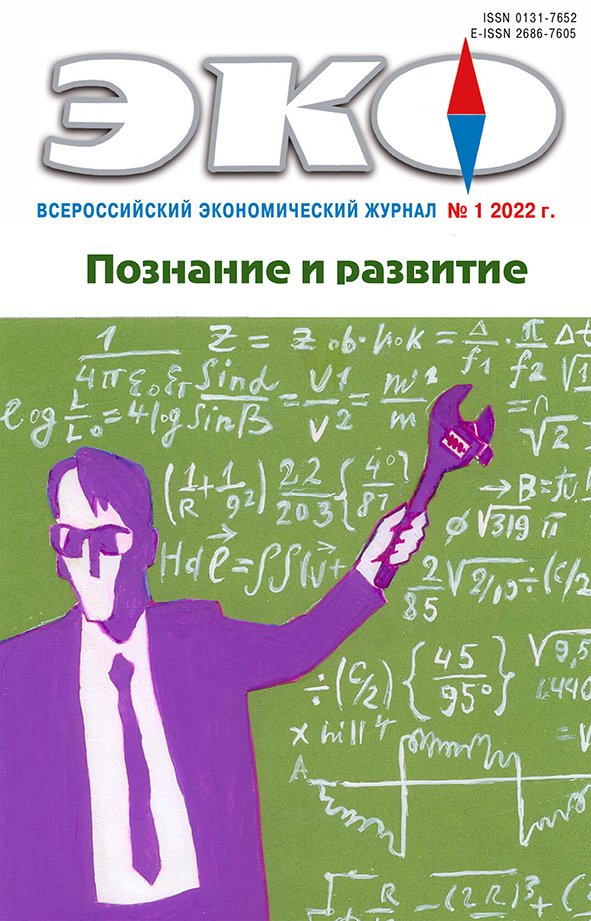Cover story: Cognition and Development
Published 2021-12-29
Keywords
- scientific discoveries; efficiency of science; motivation of scientific work; perverted incentives; indexing of scientific publications; international scientific journals; scientific policy; Scopus; World of Science
How to Cite
1.
Kryukov В, Teslya П. What Slows down Scientific Progress. ECO [Internet]. 2021 Dec. 29 [cited 2026 Mar. 1];52(1):8-34. Available from: https://ecotrends.ru/index.php/eco/article/view/4362
Abstract
More than a quarter of a century ago, many scientists noticed a significant slowdown in the flow of scientific discoveries. Every step of scientific progress has become more difficult as it requires more effort and investment in human capital while the cost of purchasing or renting equipment, tools and materials have increased. One of the most important reasons for the decline in the effectiveness of scientific activity is the irrational allocation of scientific resources. This, in turn, was the result of perverse incentives, the main one of which is increasingly becoming the desire for as many scientific publications as possible in highly rated international journals instead of searching for scientific truth. Control over scientific policy has imperceptibly passed to global publishing houses pursuing not scientific, but commercial goals. Their publishing activities and the organization of citation indexes of scientific publications have become one of the most important reasons for the slowdown in scientific progress. Russian science is in a disadvantaged state, and a reform of scientific policy is necessary to remedy the situation.References
- Багдасарьян Н. Г., Сонина Л. А. Мнимые единицы публикационной активности в обществе потребления // Высшее образование в России. 2020. Т. 29. № 12. С. 86–94. DOI: https://doi.org/10.31992/0869–3617–2020–29–12–86–94
- Балацкий Е. В. Конец науки по Дж. Хоргану // Науковедение. 2002. № 3(15). С. 186–199.
- Дежина И. Г. Научные «центры превосходства» в российских университетах: смена моделей // ЭКО. 2020. № 4. С. 87–109. DOI: 10.30680/ЕСО0131–7652–2020–4–87–109.
- Казютинский В. В. Близится ли закат «века науки»? // Эпистемология и философия науки. 2009. Т. 19. № 1. С. 136–155.
- Орлов А. И. Статистически и экспертные методы в задачах экономики и управления наукой // Научный журнал КубГАУ. 2021. № 166(02). (URL: http://ej.kubagro.ru/2021/02/pdf/01.pdf)
- Фоллмер Г. Конец науки? Размышления о книге Дж. Хоргана «Конец науки»// Эпистемология и философия науки. 2004. Т. 2. 2. С. 136–152.
- Хорган Дж. Конец науки: Взгляд на ограниченность знания на закате Века Науки / Пер. с англ. М. Жуковой. СПб.: Амфора, 2001. 479 с.
- Alberts, B. (2013). Impact Factor Distortions. Science. Vol..340. P. 6134. DOI: 10.1126/science.1240319
- Amabile, T.M., Hennessey, B.A., Grossman, B.S. (1986). Social influences on creativity: the effects of contracted-for reward. Journal of Perspectives of Social Psychology. Vol. 50. Pp. 14–23.
- Azoulay, P., Graff Zivin, J.S., Manso, G. (2009). Incentives and creativity: evidence from the academic life sciences. NBER Working Paper. No. 15466
- Bhattacharya, J., Packalen, M. (2020). Stagnation and Scientific Incentives. NATIONAL BUREAU OF ECONOMIC RESEARCH. Working Paper 26752. Available at: http://www.nber.org/papers/w26752
- Jones, B. F., Weinberg, B. A. (2010). Age Dynamics in Scientific Creativity. Proceedings of the National Academy of Sciences. No. 108(47), Pp.18910–18914.
- Bloom, N., Jones, C. I., Reenen, J. V., and Webb, M. (2020). Are Ideas Getting Harder to Find? American Economic Review. No.110(4). Pp. 1104–1144 Available at: https://doi.org/10.1257/aer.20180338
- Collison, P., Nielsen, M. (2018). Science Is Getting Less Bang for Its Buck. Science. November 16. Available at: https://www.theatlantic.com/science/archive/2018/11/diminishing-returns-science/575665/
- Fanelli, D. (2012). Negative results are disappearing from most disciplines and countries. Scientometrics 90:891–904. DOI 10.1007/s11192–011–0494–7
- Fang, FC, Casadevall, A. (2015). Competitive science: is competition ruining science? Infection Immunization V. 83. Pp. 1229–1233. DOI:10.1128/IAI.02939–14.
- Frey, B. S. (2003). Publishing as Prostitution? Public Choice. No. 116. Pp. 205–223.
- Gerow, A., Hu, Y., Boyd-Graber J, Blei D. M., Evans, J. A. (2018).Measuring Discursive Influence Across Scholarship. Proceedings of the National Academy of Sciences. No. 115(1). Pp. 3308–3313.
- Gordon, R. (2012). Is U. S. Economic Growth Over? Faltering Innovation Confronts the Six Headwinds // NBER Working Paper 18315, Cambridge, MA: National Bureau of Economic Research.
- Schibany, A., Reiner C. (2014). Can Basic Research Prevent Economic Stagnation? Foresight-Russia. Vol. 8. No. 4. Pp. 54–63.
- Tennant, J.P. (2020). Web of Science and Scopus are not global databases of knowledge. European Science Editing. Vol. 46. 27 Okt. DOI: 10.3897/ ese.2020.e51987
- Wilhite, A.W., Fong, E.A. (2012). Coercive Citation in Academic Publishing. Science. Vol. 335. 3 February.

